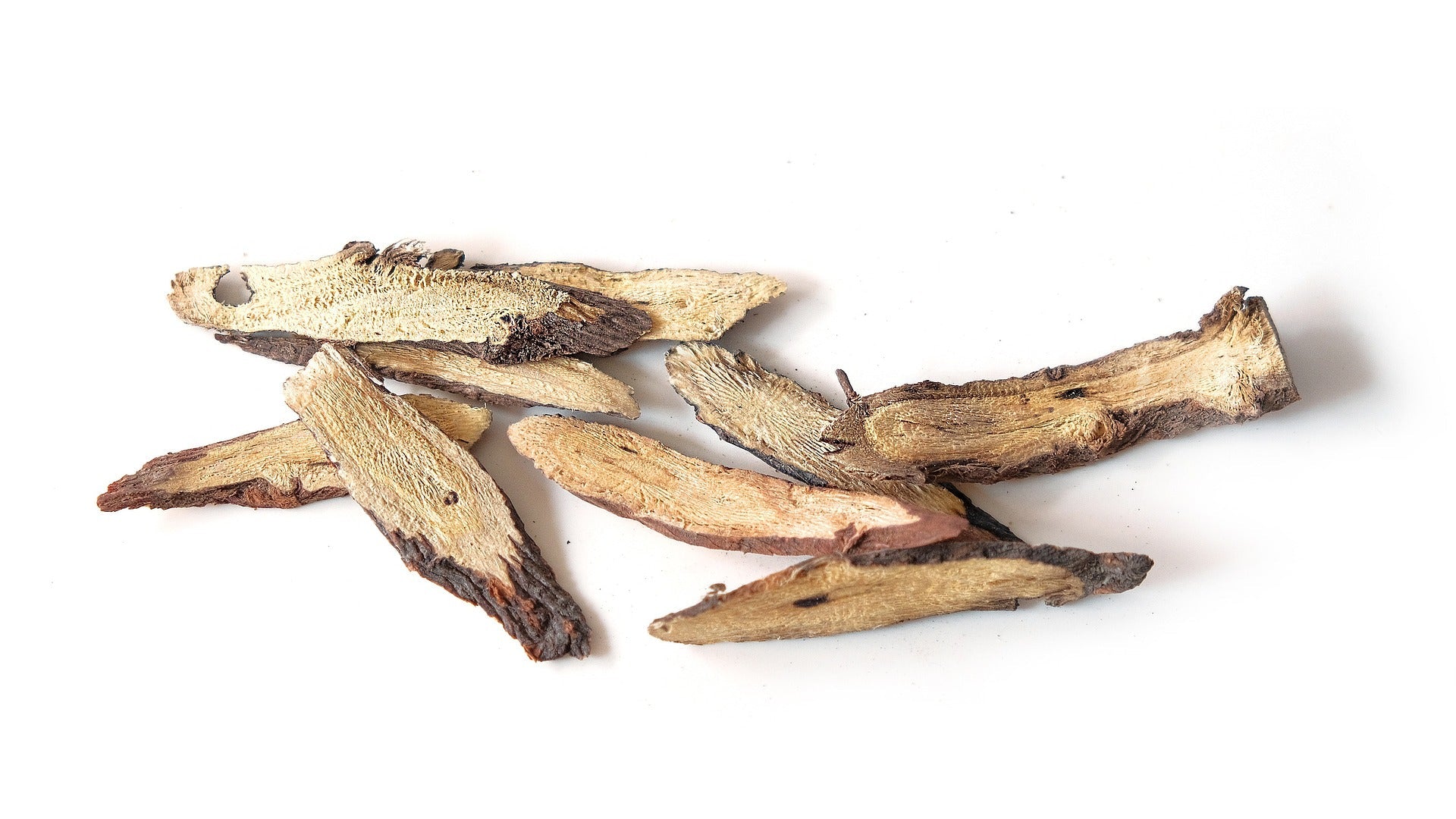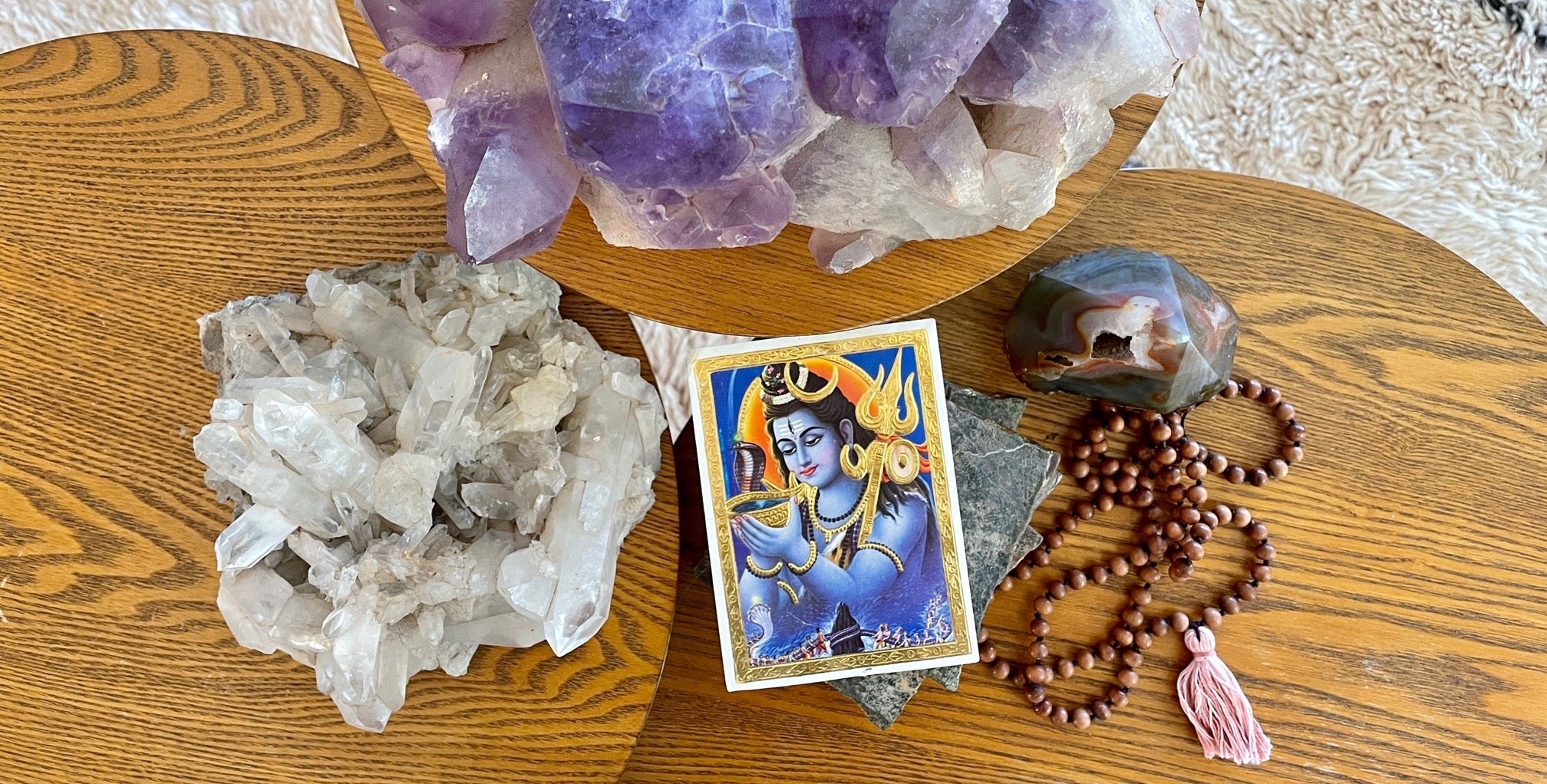
Luscious Licorice- The Sweet, Versatile & Healing Ayurvedic Root
When you hear the word licorice, you might conjure up visions of childhood sweets like Red Vines or Twizzlers. Or maybe you think of black licorice which typically is not on the top of anyone’s favorite candy list. However, licorice, from an herbalist’s perspective, is a medicinal herb that has been used for thousands of years in cooking and as a remedy for a multitude of ailments. This fortifying and replenishing herb was utilized by ancient Egyptians and Greeks, is considered an herbal staple in Traditional Chinese Medicine (TCM) and is also a revered herb in the Ayurvedic apothecary. Derived from the roots of a flowering perennial plant that is a part of the legume family, licorice is known scientifically as Glycyrrhiza glabra and also carries the nickname, yasthimadhu, in Ayurvedic medicine, which literally translates to "sweet stick". As you might have guessed, licorice imparts the sweet taste to culinary and herbal recipes; thus, making it an ideal ally to support vata dosha and pitta dosha. When used in moderation, licorice can also be beneficial for kapha dosha. Below we explore more about the relationships between licorice and the 3 doshas as well as some of our favorite ways to utilize luscious licorice to support the body and mind.
How Licorice Supports Vata Dosha
Licorice has many actions and attributes that make it an excellent herb to counteract the light, cold, dry, hard and mobile qualities of vata dosha. For instance, as mentioned above, it contains the sweet taste and is considered a demulcent in herbalism. This means that licorice has the ability to impart moisture to the tissues and mucous membranes and it can also restore the rasa, or the fluids of the body. Thus, if you are suffering from irregular bowel movements and/or constipation, licorice could be a wonderful support to get your bowel easeful and regular. Additionally, this demulcent action helps to soothe a sore, dry and/or itchy throat. These vata balancing actions are some of the reasons why we incorporated licorice into our Vata Spice Blend and Hydrate Blend Tea. Lastly, its demulcent action also helps to gently hydrate and replenish dry skin. You can experience the emollient-rich properties of licorice in our Vata Cleanser & Mask and Clarify Cleanser & Mask.
Two other aspects of licorice that we adore are its ability to tonify and rejuvenate the body and mind. When an herb has these actions, Ayurveda considers it to be a rasayana. Rasayanas like licorice, Ashwagandha and Shatavari are supportive tonics that can help reduce tiredness and fatigue; therefore, restoring strength and vitality. Correspondingly, licorice also brings a sense of calm and groundedness to the mind. This is a wonderful antidote if one is experiencing vata type emotions like excessive and/or repetitive thought patterns, worry, anxiety, fear and/or overwhelm. These restorative effects of licorice are some of the additional benefits that you will receive when using it in our versatile Vata Spice Blend and Hydrate Blend Tea.
How Licorice Supports Pitta Dosha
The sweet and demulcent properties of licorice are not only balancing to vata dosha, these aspects of licorice also comfort pitta dosha. For example, when the mucous membrane linings of the mouth, lungs, digestive, urinary and reproductive systems become inflamed by the fiery nature of pitta dosha, licorice can bring its moisturizing and soothing energy to help restore balance. This means that Ayurvedic doctors and practitioners may recommend licorice as part of an herbal formulation to help heal canker sores, ulcers like peptic or esophageal ulcers and even gingivitis.
In addition to its sweet, demulcent actions, licorice is cooling rather than warming to the body and mind. This means that licorice is a wonderful ally for pitta type skin which can be prone to dryness,, sensitivity, inflammation, blemishes and/or a combination of all of these. Even more, the cooling nature of licorice supports menopausal women who are experiencing hot flashes. This is why we knew we had to include licorice as an herbal component in our Woman’s Blend Tea. Finally, licorice is considered a sattvic herb in Ayurveda. Sattvic herbs help promote harmony, purity and a connection with the divine; therefore, licorice is thought to impart tranquility and equanimity to the mind. This is the perfect antidote for a mind that is experiencing excess pitta in the form of anger, irritability, dissatisfaction and an overly critical nature.
How Licorice Supports Kapha Dosha
The herb licorice has very similar qualities to kapha dosha. Namely, Ayurveda explains that both licorice and kapha are heavy, dense, static, dull and moist. Because of this, licorice is advised to be used in moderation for people that are predominant in kapha dosha or experiencing a kapha imbalance. One way in particular that licorice can be supportive to the sticky, heavy nature of kapha is through its expectorant action. When excess kapha accumulates in the lungs or stomach in the form of heavy, sticky mucus, licorice can be an effective way to liquefy the stagnation so that it may expel from the body. Licorice can also be used as an emetic remedy to help dispel excess kapha and ama (toxins) from the lungs and stomach; thus, it is sometimes used in the Ayurvedic panchakarma therapy known as vamana.

Contraindications for Using Licorice
Women who are breastfeeding or pregnant should not take licorice. Also, as Mount Sinai explains, people with the following conditions should not take licorice:
Heart failure
Heart disease
Hormone-sensitive cancers, such as breast, ovarian, uterine, or prostate cancer
Fluid retention
High blood pressure (hypertension)
Diabetes
Kidney disease
Liver disease
Low potassium (hypokalemia)
Erectile dysfunction
May Licorice Support You this Vata Season
We hope that you found this article informative and that it encourages you to utilize licorice in your at-home apothecary. So, the next time you experience a sore or itchy throat, irregular bowel movements, dry skin, a scattered mind, overwhelm, hyperacidity and/or inflammation, remember that licorice could be a helpful ally to bring you back into health and harmony!
We are here to support you on your wellness journey. If you have any questions about licorice, please feel free to leave us a message in the comment section below. Also, if you are ready to take your Ayurvedic healing to the next level, we invite you to book a consultation with our Clinical Ayurvedic Specialist, Laurel Odom.
Ayurvedic Products for Balancing Vata
Hero licorice image by <a href="https://pixabay.com/users/sti300p-1582113/?utm_source=link-attribution&utm_medium=referral&utm_campaign=image&utm_content=5422160">Husky Kuma</a> from <a href="https://pixabay.com//?utm_source=link-attribution&utm_medium=referral&utm_campaign=image&utm_content=5422160">Pixabay</a>
Second Licorice image by <a href="https://pixabay.com/users/focusonpc-734110/?utm_source=link-attribution&utm_medium=referral&utm_campaign=image&utm_content=3495016">Peter Chou</a> from <a href="https://pixabay.com//?utm_source=link-attribution&utm_medium=referral&utm_campaign=image&utm_content=3495016">Pixabay</a>





Leave a comment
This site is protected by hCaptcha and the hCaptcha Privacy Policy and Terms of Service apply.